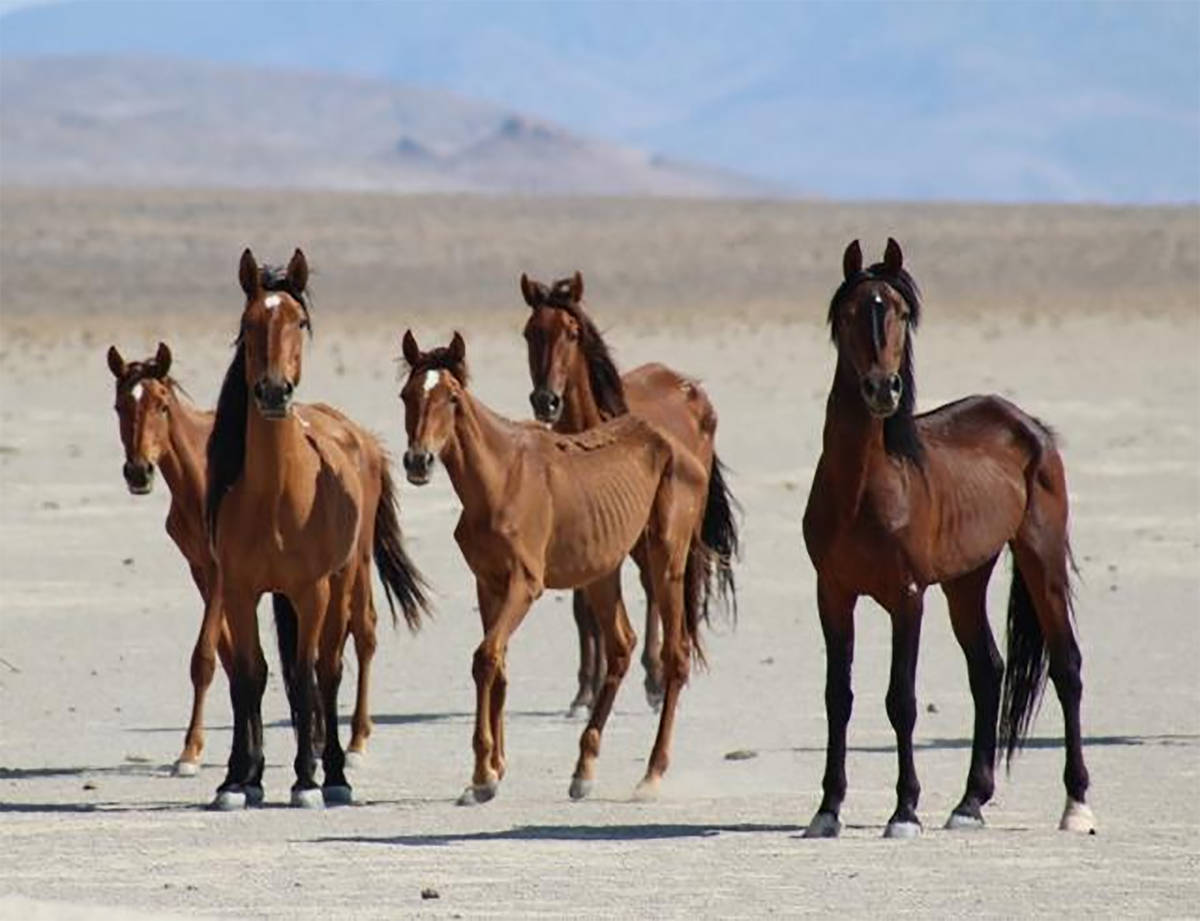Plans for BLM emergency horse gather now underway
Plans to gather approximately 450 wild horses on the Stone Cabin Herd Management Area (HMA) are now underway courtesy of the Bureau of Land Management.
The area is located roughly 28 miles east of Tonopah in Nye County.
As stated in a BLM news release, the purpose of the gather is to humanely and safely gather drought-impacted and compromised wild horses within and outside the area.
“Monitoring of the Stone Cabin HMA during spring and summer 2021 revealed limited availability to water and forage,” the release stated. “Due to the exceptional drought, little to no forage grew this year in Stone Cabin Valley. The gather is critical to ensuring the future health of the HMA lands as well as the wild horses in the area, both of which are in jeopardy due to herd overpopulation, limited water, and extremely limited forage.”
Gathering methods
The BLM operation is utilizing temporary bait and water traps consisting of a series of corral panels stocked with water and hay.
No helicopters will be used, according to the release.
The release went on to state that the declining range conditions, coupled with overpopulation, have led to a decline in body condition scores (BCS) of the wild horse population.
The body condition score of horses is based on the degree of fat cover and is a good indicator of a horse’s general health, the release stated.
“The average body condition of horses in the HMA is a BCS of 3.0 (thin), and many of the horses have a BCS of 2.0 (very thin), with some horses observed as a BCS 1 (emaciated),” the release noted. “Several springs are available to sustain minimal water needs, but with no forage, the condition of the horses is expected to continue to decline and lead to widespread suffering and death throughout the remaining summer months.”
Hoping for rainfall
Further, the release noted that through the removal of excess wild horse populations, the BLM aims to support recovery from exceptional drought conditions and the return of key perennial grasses once normal precipitation patterns return.
The action will ensure future herd health and fitness, while livestock grazing permittees have already removed livestock due to the absence of forage and exceptional drought conditions.
The BLM will continue to monitor resource conditions, according to the release.
“Due to herd overpopulation and severe drought conditions, in much of the district and particularly in the Stone Cabin area, we monitor, plan and conduct gathers like this to ensure the health of the wild horses as well as the health of federal rangelands,” said Doug Furtado, Battle Mountain District manager. “As always, we are committed to conducting safe and humane gather operations as we work to protect animal health and prevent unnecessary death due to starvation.”
Humane treatment
Moreover, the release said that the BLM’s priority is to conduct safe, efficient, and successful wild horse gather operations while ensuring humane care and treatment of all animals gathered.
“The BLM and its contractors will use the best available science and handling practices for wild horses and burros while meeting the overall gather goals and objectives in accordance with the Comprehensive Animal Welfare Policy. “Due to the nature of the bait and water trap method, wild horses are reluctant to approach the trap site when there is too much activity, thus only essential gather operations personnel will be allowed at the trap site during gather operations conducted by Cattoor Livestock Roundup, Inc. located in Nephi, Utah.”
New home
Additionally, all wild horses identified for removal will be transported to the Sutherland Off-Range Corrals in Utah, where they will be checked by a veterinarian and readied for the BLM’s wild horse and burro adoption and sale program.
The Stone Cabin HMA encompasses more than 407,700 acres of public and private lands.
The Appropriate Management Level (AML) for the Stone Cabin HMA is 218-364 wild horses.
A helicopter inventory flight completed last month determined that approximately 1,037 wild horses were identified, including foals, within the HMA, the release stated.
The most recent gather was completed in 2016.
For information on how to adopt or purchase a wild horse or burro, visit www.blm.gov/whb.
Contact reporter Selwyn Harris at sharris@pvtimes.com. On Twitter: @pvtimes
















